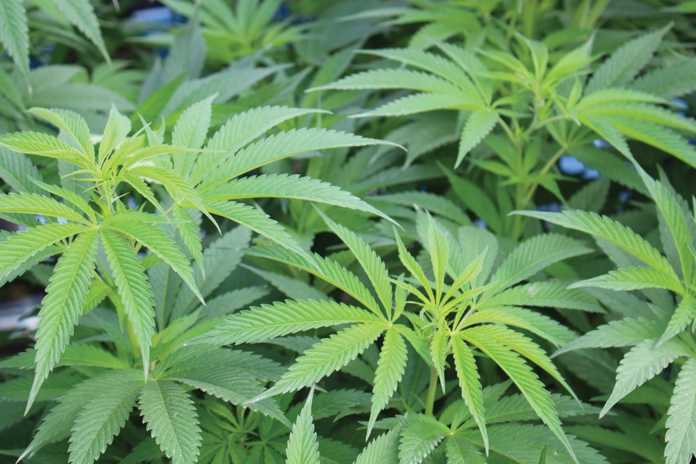Santa Cruz County is seeing a decline in its cannabis industry, with tax revenues falling far short of projections for the 2021-22 fiscal year.
County officials say that current revenues of $1.68 million are lagging behind projections by more than $1 million, and by $1.6 million for the previous year.
The County currently has 12 licensed retail locations in its unincorporated area, along with 76 non-retail businesses.
A total of six cannabis businesses have closed over the past fiscal year, a trend industry professionals say could continue.
Colin Disheroon, who owns Santa Cruz Naturals in Aptos and its sister location in Pajaro, said that the reason for the problem starts with a public wary to spend in an economy shaken by the Covid-19 pandemic.
“People can’t afford to spend money on expensive cannabis,” he said.
This problem is compounded, he adds, by the taxes tacked on to legal weed by state and local officials that add roughly 40% to the total cost at the register.
“When you have 15% excise tax, you still have the cultivation tax, the manufacturing tax, the local 7% sales taxes, it’s all too much,” he said. “All of those need to come down.”
An issue statewide for the growing industry, Disheroon’s sentiments are gaining traction among cannabis business owners.
In a letter late last year to Gov. Gavin Newsom, Senate President pro-Tempore Toni Atkins and Speaker Anthony Rendon, 30 cannabis industry professionals demanded that lawmakers work to reduce the taxes and to eliminate the cultivation tax.
“Four years after the start of legal sales, our industry is collapsing, and our global leadership and legacy is at the brink of disappearing forever,” the letter reads. “It is critical to recognize that an unwillingness to effectively legislate, implement and oversee a functional regulated cannabis industry has brought us to our knees.”
The Santa Cruz County Board of Supervisors on Jan. 25 passed a resolution requesting that Newsom and the State Legislature work to reform the tax structure and regulatory framework for the legal cannabis industry.
In his budget proposal in January, Gov. Gavin Newsom said he is willing to consider changes to the state’s tax structure. But such changes to state taxes require support from two-thirds of the Legislature.
“The Administration supports cannabis tax reform and plans to work with the Legislature to make modifications to California’s cannabis tax policy to help stabilize the market; better support California’s small licensed operators; and strengthen compliance with state law,” Newsom stated.
And state officials appear to be on board with these reforms, too. California Bureau of Cannabis Control Acting Deputy Director of External Affairs Christina Dempsey said the agency is “committed to ensuring meaningful pathways exist for California’s small, legacy and equity licensees to thrive in this legal market.”
In the last year, Dempsey said, the state consolidated three legacy programs into a new standalone cannabis department, combined three sets of state regulations governing commercial cannabis activity and awarded $100 million to support businesses’ transition to annual licensure through the Local Jurisdiction Assistance Grant Program.
The state has also distributed millions of dollars through the Cannabis Tax Fund for “equity and enforcement,” Dempsey said.
Disheroon said he supports “smart regulation and smart taxation.”
“But it’s got to be realistic, and the rates across the industry are unrealistic,” he said.
He adds that the Covid-19 lockdown also contributed to the problem, when the public was consuming more cannabis products.
As a result, the industry ramped up production, only to encounter a major slowdown, he said.
“They anticipated this growth was going to continue,” he said. “Suddenly, the growers and manufacturers have way more product than they know what to do with, and they have to pay to have that product processed.”
Much of this excess product is being shunted into the black market, worsening a problem that Prop. 64 sought to address, Disheroon said.
County officials say that illegal cannabis operators also create unfair competition by being able to sell their products for less.
This is not a problem in Santa Cruz County, where operators are instead destroying their extra or plowing their fields under, said Cannabis Licensing Manager Samuel LoForti.
But LoForti agrees that the oversupply problem is a statewide issue, but said it is also caused by more players entering the market as the industry slowly takes hold statewide.
Last year, he said, many jurisdictions added licensing operations, leading to significantly more canopy. Santa Barbara, for example, increased its canopy by more than 400 acres, he said.
“More and more people are entering the marketplace, and that has tipped the scales,” he said.
LoForti said that these economic problems are not surprising, and were predicted in industry forecasts when recreational marijuana was legalized, which also foretold of independently owned cannabis farms collapsing as market rates decrease.
Still, he said the problem will eventually improve.
“I see market stabilization as an inevitability,” he said.









